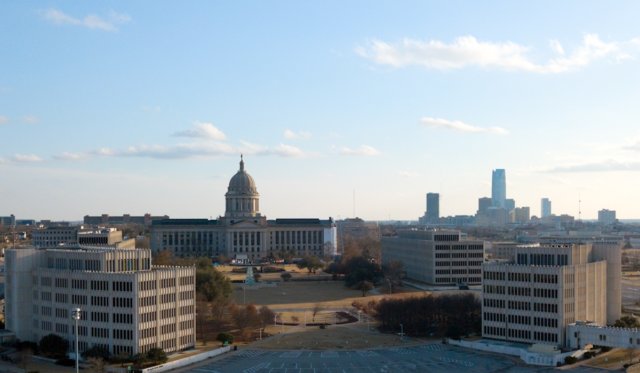

With lawmakers intending to adjourn the 2018 regular session Friday, the Oklahoma Senate attempted to send SB 888 to Gov. Mary Fallin today, but a vote on the adoption of House amendments failed to receive a majority of those voting.
The controversial bill would have terminated the refundability of wind energy tax credits — meaning refunds given beyond the elimination of tax liability — beginning Jan. 1, 2019. The exact language of the measure came together over the past month, pushed hard by lobbyists who represent oil and gas interests. Many petroleum industry leaders have expressed frustration in recent sessions as their tax liabilities increased while tens of millions of dollars in credits have been paid out to wind companies.
“I’m not here to demonize any industry,” Sen. Julie Daniels (R-Bartlesville) said. “However, I think we have been overly generous to this industry. (…) Over the years, this credit has been amended to the benefit of this industry many times over.”
But with lobbyists on both sides of the issue saying all Monday that they expected a close vote, the Senate never actually reached a vote on advancing the measure. Instead, a vote to accept the controversial House amendment on SB 888 failed 18-23.
“I think this is probably one of the worst bills I’ve had to vote on this session,” Sen. Roland Pederson (R-Burlington) said while debating against the bill. “It sends the wrong message to other industries about us in Oklahoma honoring our word.”
To that end, the Wind Coalition has routinely said there will be lawsuits filed against the state if SB 888 — or any measure like it — were to pass and be signed by the governor.
‘This industry should be no different’
Sen. Mary Quinn (R-Claremore) carried the bill Monday on the Senate floor and answered a series of questions from numerous senators, including Sen. Roger Thompson (R-Okmulgee).
In answering one question from Thompson, Quinn spoke at length about the need for many people, state agencies and industries to make “adjustments” as a result of recent revenue shortfalls:
I think the important thing for us to remember is that we as a body from time to time have to adjust. You can look at the number of budgets over the last eight years, for example, the last three being anywhere from $600-something million shortfall, to $1.2 billion to almost $900 million, and we had to make adjustments. Part of the reason why we’ve had to make those adjustments is that tax credits like this have been so egregious that we’ve had to go back to our core services and to the folks back home and say, ‘We don’t have the money.’ So I would think if we can go back to the taxpayers of Oklahoma and say that we’ve got to make some adjustments, then these companies who are out of state, who are out of country, who are multi-billion-dollar companies, I would think it was probably possible for them to make some adjustments as well, just like our agencies have had to make some adjustments, and just like the taxpayers of Oklahoma when we raised taxes have to make some adjustments. And that is exactly what has happened in the last few years. Taxpayers have made adjustments, and other entities — other industries — in this state have made adjustments. This industry should be no different in having to make the adjustments necessary for us to continue to provide those core services for the citizens we are supposed to represent.
Sen. Casey Murdock (R-Felt) pressed Quinn with additional questions.
“You’ve mentioned several times how these incentives are going to people who are out of state and out of the country,” said Murdock, who has routinely preached the benefits of wind development in the Oklahoma panhandle where he lives. “Wouldn’t you agree it is wise to get people to invest in your state to build jobs, to incentivize growth?”
Quinn said the benefits of wind energy have often been created by the state making ad valorem payments to local communities.
“I would say that is reasonable policy, as long as you can afford (the cost) associated with it,” Quinn said.
Murdock pleaded for his fellow members to oppose SB 888.
“For the sake of every small school that is struggling, vote no on this,” he said.
With SB 888 failing to advance Monday, lawmakers committed to ending the wind tax credit refundability could turn their attention to HB 3716, a bill that surfaced Friday. HB 3716 eliminates the refundability but allows companies to retain the credits for 20 years to decrease their Oklahoma tax liabilities. That provision would primarily help power providers headquartered in the state of Oklahoma.
State still recruiting wind industry
Mark Yates, Oklahoma director of the Wind Coalition, said prior to Monday’s vote that he found it ironic that the state has continued its efforts to recruit wind projects while moving to go back on its word with existing investors.
“There’s no doubt, the Oklahoma Department of Commerce has been at the [Wind Power] conferences over the past several years and have actively recruited companies investing in the wind space to come to Oklahoma,” Yates said. “(They have been) advertising the incentive programs that the state did offer before the sunset to come invest capital here in the state of Oklahoma, and they continue to recruit companies in the wind space to come to Oklahoma.”
Yates said he expected Oklahoma to have a presence recruiting wind projects at next week’s American Wind Energy Association conference in Chicago, something he considered ironic.
But Leslie Blair, public information officer for the Oklahoma Department of Commerce, countered Yates’ remarks with clarification about the agency’s purpose in attending wind-power conferences.
“We don’t attend AWEA to tour wind incentives. For at least the last five years, we have gone to recruit the supply chain for the industry,” Blair said. “There are three CareerTechs attending the show who are actively involved in training workers in the maintenance, repair and overhaul of the wind turbines. As long as those blades are turning, we have to have the trained workforce to service the turbines.”
(Editor’s note: Interests on both sides of the SB 888 debate have been advertising on NonDoc.)




















